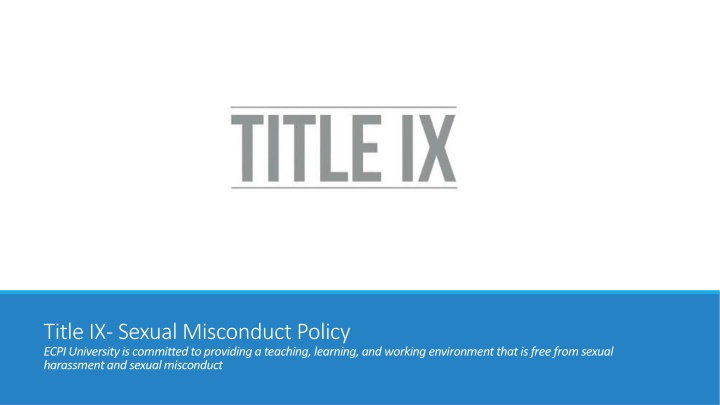
Title IX and Sexual Misconduct Policies at ECPI University
Learn about Title IX, the U.S. Department of Education's policy against discrimination based on sex, and ECPI University's commitment to providing a safe environment free from sexual harassment and misconduct. Explore definitions under the Clery Act and VAWA to understand the importance of preventing sexual violence on campus.
Download Presentation

Please find below an Image/Link to download the presentation.
The content on the website is provided AS IS for your information and personal use only. It may not be sold, licensed, or shared on other websites without obtaining consent from the author. If you encounter any issues during the download, it is possible that the publisher has removed the file from their server.
You are allowed to download the files provided on this website for personal or commercial use, subject to the condition that they are used lawfully. All files are the property of their respective owners.
The content on the website is provided AS IS for your information and personal use only. It may not be sold, licensed, or shared on other websites without obtaining consent from the author.
E N D
Presentation Transcript
Title IX-Sexual Misconduct Policy ECPI University is committed to providing a teaching, learning, and working environment that is free from sexual harassment and sexualmisconduct
What is What is Title IX Title IX? ? The U.S. Department of Education s Office for Civil Rights (OCR) enforces, among other statutes, Title IX of the Education Amendments of 1972. Title IX protects people from discrimination based on sex in education programs or activities that receive federal financial assistance. Title IX states: "No person in the United States shall, on the basis of sex, be excluded from participation in, be denied the benefits of, or be subjected to discrimination under any education program or activity receiving Federal financial assistance."
Sexual Harassment and Sexual Sexual Harassment and Sexual Misconduct Policy Misconduct Policy This policy applies to all members of the University community including, but not limited to, students, employees, interns, contractorsand vendors (including their employees), guests and visitors while they are on University property or participating in University programs and activities. This policy prohibits sexual harassment and sexual misconduct ( Prohibited Conduct ) on University property and in all University programs and activities. All participants in University programs and activities are responsible for helping to ensure our University community is kept free of Prohibited Contact Individuals who are subjected to Prohibited Conduct in violation of this policy are encouraged to report these incidents.
Definitions under the Clery Act Definitions under the Clery Act The Clery Act defines sexual assault as a forcible or nonforcible offense under the uniform crime reporting system of the Federal Bureau of Investigation. This system includes the National Incident-Based Reporting System (NIBRS), which defines forcible sex offenses to include any sexual act, including rape, sodomy, sexual assault with an object, or fondling directed against another person, without the consent of the victim including instances where the victim is incapable of giving consent. NIBRS also includes incest and statutory rape as nonforcible sex offenses. Violence Against Women Act (VAWA). Federal law enacted in 1994, which promotes the investigation and prosecution of violent crimes against women, among other objectives. Recently, it amended the Clery Act [42 U.S.C. 13701-14040], through the Campus Sexual Violence Elimination Act (SaVE) provision, Section 304.
Definitions under VAWA Definitions under VAWA (Violence Against Women Act) (Violence Against Women Act) Dating violence includes violence committed by a person who has been in a social relationship of a romantic or intimate nature with the complainant; the existence of such a relationship shall be determined based on consideration of the length of the relationship, the type of relationship, and the frequency of interaction between the persons involved in the relationship. Domestic violence includes felony or misdemeanor crimes of violence committed by: a current or former spouse or intimate partner of the complainant, a person with whom the complainant shares a child, a person who is cohabitating with or has cohabitated with the complainant as a spouse or intimate partner, a person similarly situated to a spouse of the complainant under the jurisdiction s domestic or family violence laws, or any other person against a complainant who is protected under the domestic or family violence laws of the jurisdiction. Stalking is defined as engaging in a course of conduct directed at a specific person that would cause a reasonable person to fear for their own safety or the safety of others or to suffer substantial emotional distress. This also includes instances of stalking based on sex including stalking that occurs online or through messaging platforms, commonly known as cyber-stalking when it occurs in the school s education program or activity.
Some key issue areas in which recipients have Title IX obligations are: recruitment, admissions, and counseling; financial assistance; athletics; sex-based harassment, which encompasses sexual assault and other forms of sexual violence; treatment of pregnant and parenting students; treatment of LGBTQI+ students; discipline; single- sex education; and employment. Scope of Title IX No recipient or other person may intimidate, threaten, coerce, or discriminate against any individual for the purpose of interfering with any right or privilege secured by Title IX or its implementing regulations, or because the individual has made a report or complaint, testified, assisted, or participated or refused to participate in a proceeding under Title IX. Title IX applies to schools, local and state educational agencies, and other institutions that receive federal financial assistance from the Department For a recipient to retaliate in any way is considered a violation of Title IX. The Department s Title IX regulations (Volume 34, Code of Federal Regulations, Part 106) provide additional information about the forms of discrimination prohibited by Title IX.
LGBTQI+ Students LGBTQI+ Students The mission of the U.S. Department of Education s Office for Civil Rights (OCR) is to ensure equal access to education and to promote educational excellence through vigorous enforcement of civil rights in our nation's schools. To serve this mission, OCR enforces civil rights laws to protect all students from unlawful discrimination and harassment based on race, color, national origin, sex, disability, and age. This includes students who are lesbian, gay, bisexual, transgender, queer, questioning, asexual, intersex, nonbinary, and individuals who identify their sexual orientation or gender identity in other ways (LGBTQI+). Bullying, harassment, exclusion from school activities, and other forms of discrimination can interfere with LGBTQI+ students access to a safe and inclusive school environment. Federal law requires schools to ensure that LGBTQI+ students and other students have equal access to all aspects of a school s programs and activities.
What is Sexual What is Sexual Harassment Harassment? ? Conduct on the basis of sex that satisfies one or more of the following: Quid pro quo harassment Hostile environment harassment Sexual assault Dating violence Domestic violence Stalking A school employee offers something to an individual in exchange for sexual conduct Any unwelcome sexual conduct, such as unwelcome sexual advances, requests for sexual favors, and other verbal, nonverbal, or physical conduct of a sexual nature Violence committed by a person who has been in a social relationship of a romantic or intimate nature with the complainant; the existence of such a relationship shall be determined based on consideration of the length of a relationship, the type of relationship, and the frequency of interaction between the persons involved in the relationship. Violence Violencecommitted by a or former spouse or intimate partner of the complainant, a person with whom the complainant shares a child, a person who is cohabitating with or has cohabitated with the complainant as a spouse or intimate partner, a person similarly situated to a spouse of the complainant under the jurisdiction s domestic or family violence laws, or any other person against a complainant who is protected under the domestic or family violence laws of the jurisdiction by a current Engaging Engagingin a course of conduct directed at a specific person that would cause a reasonable person to fear for their own safety or the safety of others or to suffer substantial emotional distress. This includes stalking This includes stalkingbased on sex including stalking that occurs online or through messaging platforms, commonly known as cyber-stalking when it occurs in the school s education program or activity. A situation of discriminatory or sexual nature that has occurred and created an adverse setting. An intimidating or offensive environment that causes a person to be fearful
Violations of this Policy should be reported to the Title IX Coordinator. Title IX Coordinator s responsibilities include: Promoting the creation of policies, procedures and notifications designed to ensure university compliance with Title IX; Being trained annually regarding sexual harassment, including sexual violence, and is familiar with the university's grievance procedures; Overseeing implementation of grievance procedures, including investigation and disposition of complaints, and identifying and addressing any problems throughout an investigation; Reporting Answering questions and providing guidance about Title IX compliance and the university's related policies and procedures; Serving as a liaison to the U.S. Department of Education's Office of Civil Rights and other state and federal agencies that enforce Title IX; Ensuring the campus community and university employees are adequately trained and educated on their Title IX compliance responsibilities; and Monitoring all other aspects of the university's Title IX compliance. Shanna Campise, Title IX/Section 504 Coordinator 5555 Greenwich Rd. Virginia Beach, VA 23462 (757) 994-1054 TitleIX_coordinator@ecpi.edu
Investigatory and Disciplinary Procedures Investigatory and Disciplinary Procedures For purposes of this policy, a Complainant is any individual who is reported to have been subjected to Prohibited Conduct and a Respondent is a person who is accused of violating this policy. Complainants and respondents will be treated equitably. Upon receipt of a formal complaint, the Title IX Coordinator will assess for a possible Title IX violation. If a possible violation is found, written notification will be provided to both the complainant and respondent which contains the allegations and facts, details on the formal grievance process (investigation and live hearing), details on the informal resolution process (if an option), a statement that the parties can request to inspect and review certain evidence, and information regarding the code of conduct, presumption of innocence and false statements. Efforts will be made to ensure confidentiality to the extent practical consistent with the goals of preventing further instances of the alleged Prohibited Conduct and conducting a fair and thorough investigation. If a possible violation of Title IX is not found, if the Complainant notifies the Title IX Coordinator in writing that he/she wishes to withdraw the complaint or if the respondent is no longer employed by the University, both parties will be sent written notice which includes the reason for the dismissal and the right to appeal. Please note that this policy sets forth our goals of promoting a teaching, learning and work environment that is free of Prohibited Conduct. The policy is not designed or intended to limit the University s authority to discipline or take remedial action for conduct the University deems unacceptable, regardless of whether that conduct meets the definition of Prohibited Conduct.
WellConnect: Support is provided by calling this toll-free number 1-866-640- 4777 and speaking to someone. The line is staffed 24/7 and individuals are connected to licensed counselors who can provide telephonic support, or if appropriate, provide face-to-face counseling. National Domestic Violence Hotline: 1-800-799-7233 National Sexual Assault Hotline: 1-800-656-4673 Rape, Abuse and Incest National Network (RAINN): https://www.rainn.org US Dept. of Justice Office on Violence Against Women: https://www.justice.gov/ovw National Coalition Against Domestic Violence: http://www.ncadv.org/ National Sexual Violence Resource Center: http://www.nsvrc.org/ Your local police department Confidential Resources

